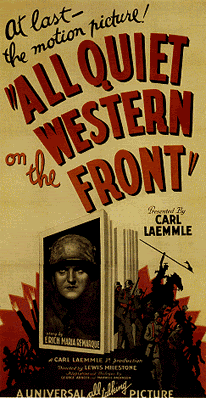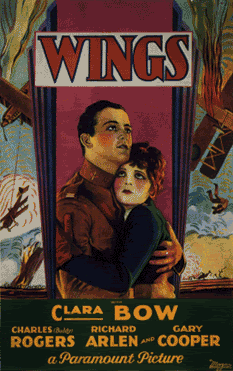
Winner of "Best Production" Category at the 1929/1930 Academy Awards (3rd annual ceremony)
After lots of Olympics and lots of life, I finally got a chance to sit down and watch All Quiet On the Western Front last Wednesday, August 27th.
The sound quality on the DVD wasn't spectacular, so I was happy to be able to turn on the subtitles.
I don't watch a lot of war movies, because, well...I know that war is stupid and pointless and apparently going to happen again and again. (Willa Cather probably said it best: "There are only two or three human stories, and they go on repeating themselves as fiercely as if they had never happened before.") I can't stomach any movie that overly glorifies war, and as for a movie that highlights how stupid war really is, like I said, I know that. It's hard for me to watch a lot of pain and suffering in the limited time I have for my entertainment, because frankly, there's enough pain and suffering in the real world for my taste without having to see it on film or in theater, particularly if the movie or play does not help me somehow make sense of it all and order the world a little better.
And so it's interesting to me that the last two Best Picture films I have seen now have been about war, specifically World War I. Though the war had ended over a decade previous to the movie All Quiet on the Western Front, that didn't mean that people were done processing what had happened and trying to make sense of it all. Not to mention trying, like Erich Maria Remarque tried, to figure out how to never let such a terrible thing as a world war happen ever again. Perhaps they should have tried harder. And this film is such a contrast to Wings in many ways. I said above that I don't need a film to tell me that war is stupid, because i already know that -- but this is the original film that pointed out that war is stupid. And I don't think it would be exaggerating to call this film great -- it was important in its time, and it feels just as important today. I certainly will not be the first person to mention the fact that there is a timelessness to the message of pacifism, of the futility and absurdity and indignity and pointlessness of war. In the introduction, which was from TCM, the host Robert Osborne quotes someone who once said that all people in all countries should have to watch this movie once a year until the word war is eradicated from every language. Would that it were so easy...
I have to say that in the war scenes, particularly the trench scenes where the soldiers were being bombarded, all I wanted was for it to end, and I kept feeling an oppressive claustrophobia -- which means, I think, that they were perfectly done. There's no way to convey to the viewer the true feelings of the horrors of war, but these raw scenes filled with men soiling themselves, being injured and running wild causing their own deaths by running in sight of the enemy, freaking out after days of constant shelling and being unable to leave their literal rat holes -- they most certainly give the viewer at least a glimmer of understanding of what war must actually feel like. The scene in which the men in the bombarded underground bunker beat a swarm of rats to death with their shovels, seemingly relieved to have something to do besides wait to see if they would live or die, was truly horrifying.
The thing that I think was truly revolutionary about this film was the fact that it was a movie for a largely American audience in which the German enemy wasn't painted as villianous, or monstrous, or devils, or somehow larger than life, or anything like that. Instead, the German soldiers were rendered in exactly the same way that the French or American soldiers would have been rendered had it been from the other side's point of view -- as human, as scared kids trying not to get killed, going where they were told as if they were in a bad dream that would never end. This refusal to paint the other side as the bad guys is so profound (though certainly with a bad guy or two among them, just like in all countries -- Himmelstross, I'm looking at you). I mean, if you take a step back and think of this story as a story written by a German man based on his own war experience and put it back into his context, then it makes sense. But the fact that it was made into an American film is where the profundity creeps in. You didn't need to be one nationality or another to relate to and understand this film. It didn't matter whether the soldiers' helmets were pointy on top and they reported to the Kaiser or not. The story could be adopted by American audiences because it wasn't a German story -- it was everyone's story. I mean, could there be any more striking scene than the soldier blown apart by a hand grenade, with nothing more visible than his arms clutching a barbed wire fence? No helmet, no patches, no country any longer. Just an unnatural and terrifying moment that no human being should ever have to witness, those remnants of arms that could be anyone's arms.
I'll end this with a great quote that was perhaps my favorite from the movie: "Every full-grown emperor needs one war to make him famous." Even when those emperors happen to be elected officials, I would not hesitate to add.




